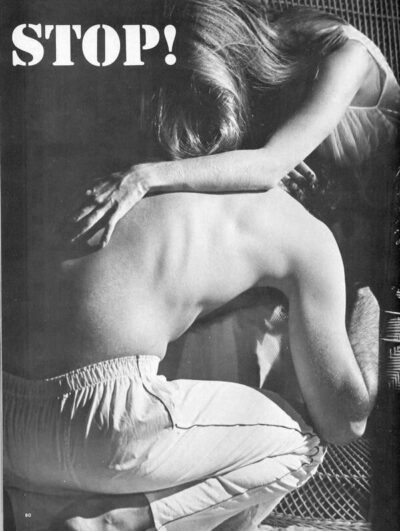 One of the most famous “lost” films of the late Twentieth Century was this never-released counterculture drama from the late Bill Gunn (1929-1989). Made under the auspices of Warner Bros, STOP! was the first of two features directed by Gunn (the better known GANJA & HESS being the second), a playwright, novelist, actor and screenwriter—and the fourth African American man to direct a big studio feature (following Gordon Parks, Ossie Davis and Melvin van Peebles).
One of the most famous “lost” films of the late Twentieth Century was this never-released counterculture drama from the late Bill Gunn (1929-1989). Made under the auspices of Warner Bros, STOP! was the first of two features directed by Gunn (the better known GANJA & HESS being the second), a playwright, novelist, actor and screenwriter—and the fourth African American man to direct a big studio feature (following Gordon Parks, Ossie Davis and Melvin van Peebles).
STOP’s lineage is very much in line with counterculture skewering fare like MYRA BRECKINRIDGE and PERFORMANCE (both 1970). Like the latter film (and also GANJA & HESS), STOP! was subjected to a great deal of post-production tampering by Warners, who pruned Gunn’s initial three hour cut to half its length, and withheld the film from the market indefinitely (although isolated screenings have been known to occur).
It features Michael (Edward Bell), an American writer stationed in San Juan with his wife Lee (Linda Marsh). They reside in a house Michael has inherited from his late brother, who went mad, killing his wife and himself.
Michael grows listless, neglecting his writing and his spouse. She’s quite nonplussed upon arriving home from a daytime outing to find her husband canoodling with a prostitute (Vicky Hernández), who compounds the humiliation by demanding Lee foot the bill. Lee complies and then runs off, only to be chased down by Michael, who offers a long-winded diatribe stating, in essence, that he’s fallen out of love with her.
Things, however, would appear to be looking up. Richard (Richard Dow), a distant acquaintance, promptly enters the scene together with his wife Marlene (Marlene Clark). Both Lee and Michael are attracted to the couple, and after spending a day together this foursome visits a nightclub. There Richard leaves with a woman he’s just met, and Lee, Michael and Marlene head back to the house for a threesome. The following morning Richard turns back up to make a cocktail of orange juice and mescaline, which he serves to his three charges, inspiring a highly fragmented and subjective finale in which Michael may or may not emulate the actions of his late brother.
In addition to Gunn, a debuting talent on STOP! was cinematographer Owen Roizman (1936-2023), of THE EXORCIST and many other high profilers. Roizman’s gifts are evident in the crisp imagery and dynamic compositions, although there’s also a great deal of self-conscious and show-offy camerawork. The fractured editing further belies Gunn and Roizman’s amateur status, as does the clumsy storytelling (it’s difficult to discern if the frequent cutaways to Michael’s brother killing his wife were intended as flashbacks or flash-forwards).
There are nonetheless many powerful elements. The performances have a sense of immediacy, resulting in dialogue that feels spontaneous and unscripted (even though the film’s every aspect is said to have been meticulously planned out), and there’s a powerfully hallucinatory vibe (harkening forward to GANJA & HESS), with the last ten minutes playing like outtakes from THE TRIP (1967). The sex scenes, while no longer as shocking as they probably seemed in 1970 (when those scenes were strong enough to get the film slapped with an X rating), are vivid and startling a la the carnal content of LAST TANGO IN PARIS (1972) and DON’T LOOK NOW (1973), conveying psychological unrest in addition to eroticism.
So the talent infusing STOP! was undeniable. Its problems are most likely due to the post-production meddling by Warners, and until a more complete print turns up those problems will remain.
Vital Statistics
STOP!
Warner Bros.
Director: Bill Gunn
Producer: Paul M. Heller
Screenplay: Bill Gunn
Cinematography: Owen Roizman
Editing: Sam Ornstein
Cast: Edward Bell, Linda Marsh, Richard Dow, Marlene Clark, John Hoffmeister, Anna Marie Aries, Benito Alvarez, Nydia Caro, Charles A. Gibbs, Vicky Hernandez, Miki Jaeger, Michael Peters, Angel Rigau
